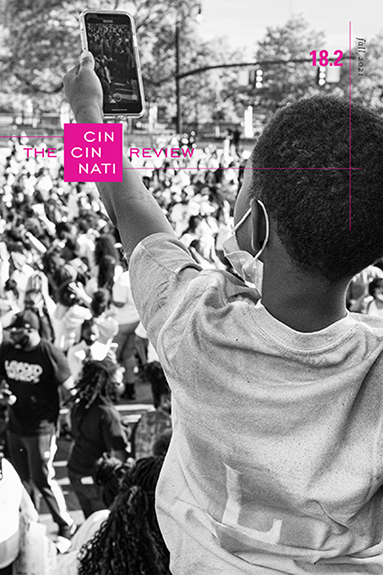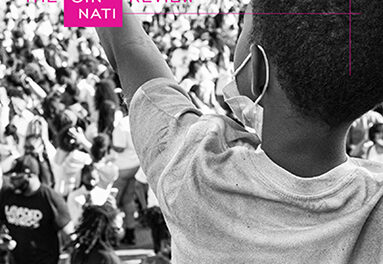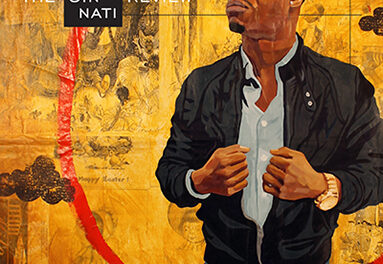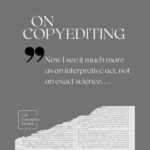We are pleased to share this review by Brian Trapp of Stanley Elkin’s The Magic Kingdom (Dalkey Archive Press, 2000 edition), which appeared in Issue 18.2 as part of a special multigenre review feature on joy, hope, and delight (read the entire feature here).
Nobody reads Stanley Elkin anymore. He’s too perverse, too ironic, too wordy, too dark. I once heard Charles Baxter describe Elkin’s sixth novel, The Magic Kingdom (1985), as “diabolical.” Indeed, at first glance, it does seem like a cruel joke: Eddy Bale, an Englishman grieving the death of his only child from cancer, plots a Make-a-Wish-Foundation-like trip to Disney World for seven dying children. Elkin assigns these kids absurd terminal illnesses: Benny Maxine has Gaucher’s disease, sugar accumulating in his cells, or as he says, “I’m candy.” Charles Mudd-Gaddis has progeria, which makes him look (and act) like an octogenarian. Rena Morgan wipes away her cystic fibrosis fluids with skillful sleights-of-hand. Their caretakers are equally absurd: one nurse, Mary Cottle, who as a “carrier” for genetic disorders has been told not to have children, regularly sneaks off to masturbate. When I teach this book each year to a group of future therapists and special-education teachers, I warn them: “There is perhaps a gratuitous amount of masturbation.”
But Elkin wasn’t some sicko, or he was in a more profound way: he had multiple sclerosis and was disabled himself, attuned to the absurdities of America and our responses to the body. Long known for his “black comedy,” Elkin maintained that the term didn’t fit, that his work was shot through with a deep optimism. And I’d argue that The Magic Kingdom is the most optimistic of novels.
Of course it would be Disney World. When I was fourteen, my parents took my twin brother and me, something they’d promised for years, usually as an enticement to complete some disgusting task of manual labor. I’d clean out the black mold from the garage but find myself no closer to Florida. When we finally went, I was too full of teenage angst to enjoy it. But our trip did have its perks: my twin brother had severe cerebral palsy and used a manual wheelchair, which meant we zipped to the front of the line for rides, ahead of the able-bodied saps who still had to wait in the heat. My brother had a fine time but was freaked out by Mickey Mouse, who as far as he was concerned was just some stranger in a mouse suit. He would have preferred a trip to the mall (he loved shopping and air conditioning). But what I remember most was all the people staring at us and smiling madly, as if to say, “How cute: a disabled boy at Disney World.” I could practically hear the singsongy “Awwwww . . .” So it’s no surprise that to skewer America’s sentimental attitudes toward disabled people, Elkin brings his motley crew of disabled kids to the most sentimental place on Earth.
Late in the book, a park employee mistakes the group of terminally ill kids for a troupe of actors just pretending to be sick. He fears it’s in bad taste: “He couldn’t deny the outrageousness of the concept. Only where was the art? What did it take, after all, to display the dying?” This novel navigates the ethics of representation, crossing lines less to violate than to illuminate. Written during the telethon era, in which nonprofits competed for donor dollars by broadcasting the supposed suffering of disabled children, The Magic Kingdom begins with Eddy Bale begging for starter money from the Queen of England, framing his son’s suffering for the Ask: “They turned his blood into dishwater. They caused him such pain, Monarch.” She writes Bale a check but orders him not to cash it, just to show it to his other marks. Though we might sympathize with Bale, who is insane with grief, the Queen teaches us to be wary. In his representation of disability, Elkin is less interested in disabled suffering, which capitalism inevitably turns into commerce, than in the rowdy thrum of life.
The novel then shifts focus to the true heroes of the book: the children. Elkin adopts a roving third-person omniscient point of view, giving each kid a unique subjectivity. Benny Maxine, fifteen, talks like a Borscht Belt comedian and would rather go to the nude beaches in Monte Carlo. A committed gambler, “he lived with hope,” betting that he’ll live long enough to see the next joke through. Like my brother, most of the kids don’t even want to go to Disney World. Instead, they obsess over getting into Room 802, the extra suite Mary Cottle has secretly rented to slip away for bouts of self-pleasure. Each child daydreams of what they’ll do there. One wants to order room service and control his own diet. Another is already going through puberty and wants to explore her body. When constant surveillance by medical professionals and overbearing parents makes the whole world seem like a hospital, their actual “dream holiday” is their own eccentric privacy.
In one of the most poignant scenes, a nurse, Colin Bible, takes the children to view a Disney parade. But the parade is not Disney characters—it’s the bodies of the supposedly “normal” park attendees. Long considering themselves the grotesque ones, the children now notice the grotesque reality of the “normal” bodies in front of them, like a man’s “enlarged veins on his legs like wax dripping down Chianti bottles in Italian restaurants.” As often happens in this novel, the characters fall into Cockney slang: “It’s simply a case of your lumping, right grotty greedguts.” Then they just rudely point. With this comic reversal, this staring back, Elkin erases the distance between “normal” and “disabled,” revealing the normal body to be just as much of a fantasy as the Disney characters themselves.
But Elkin is attuned to the realities of the disabled body too, the daily aches and pains of impairment. It’s in this shadow of sickness that Elkin shines brightest, showing the joy of being alive. In one scene, Benny and Rena give the slip to their handlers in the hotel and flirt, mocking the guests and staff with teenage silliness. Later in the book, when the children sneak away with Colin to sunbathe on a lagoon island, Elkin drops the grotesque lens and describes the children staring at each other in a very different way: “And it was wondrous in the negligible humidity how they gawked across the perfect air, how, stunned by the helices and all the parabolas of grace, they gasped, they sighed, these short-timers who even at their young age could not buy insurance at any price, [. . .] how, glad to be alive, they stared at each other and caught their breath.” In their pending mortality, the staring shifts here not to ridicule but to delight in their bodies as they inhabit a moment of lyrical beauty.
Benny and Charles Mudd-Gaddis are the first to slip into Room 802, where they spy on Mary Cottle masturbating, which Benny declares is the “real Magic Kingdom.” It’s a scene of uncomfortable nonconsensual voyeurism, as if Elkin is casting disabled boys in a raunchy teen sex-comedy. But Elkin switches to less problematic fare when Benny returns to Room 802 with the other children, as they enjoy the room for themselves. In a plot too convoluted to explain, they are rudely confronted by two vengeful park employees dressed as Mickey Mouse and Pluto, which sends Rena Morgan into a deadly coughing fit. On her literal deathbed, she declares her love for Benny. The trip doctor, so sure that he’d selected only children who could survive the trip, is incredulous but realizes that he’d “simply failed to factor her desire into the equation.” She died because the doctor didn’t consider the fullness of her life, that she could fall in love.
This book, in the end, is a comedy, which is a genre of survival. The hero falls but gets back up. The novel concludes not with a funeral but with an implied birth. Mary Cottle, mourning Rena’s death, breaks her eugenic celibacy and procreates with Eddy Bale. In a tour-de-force monologue, she invokes the historical record of disability, from early mythic “monsters” to the “unfit” and “disabled” of the modern age: “Thinking, Now, now, goddamn it, now! And accepting infection from him, contagion, the septic climate of their noxious genes.” Rather than give in to dread, they embrace the inevitability of human vulnerability. They choose to have a disabled child.
In this most unlikely, most hopeful of novels, Elkin shows how desire does not quit the body just because of a diagnosis. He shows his disabled characters as sick and dying, sure, but also complicated and funny and very much alive. As we approach the final days of the COVID pandemic, in which doctors have denied care to disabled patients because they lacked a “quality of life,” Elkin’s novel is now more relevant than ever. With his full-throated, language-drunk voice, the maximalist Elkin makes a profound case for disabled “quality of life,” in all its flawed and overflowing humanity. In the end, he imagines that someone like my brother could be born and met not with mourning, not with pity, but with welcome for all the delight to come.
Brian Trapp teaches creative writing and disability studies at the University of Oregon. He is currently a 2021–22 Steinbeck fellow at San Jose State University. His work has been published in the Kenyon Review, Gettysburg Review, and Longreads, among others. He received his PhD in creative writing and disability studies from the University of Cincinnati.










